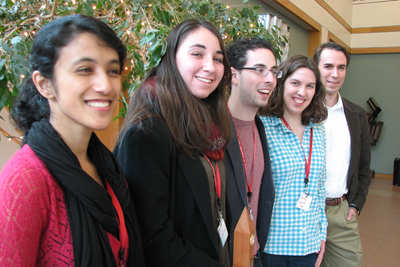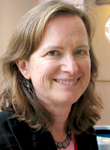Sustainability summit touts Cornell as living laboratory
By Krishna Ramanujan


The announcement of a new sustainability advisory committee, as well as student and staff sustainability awards, were highlights of the annual summit of the President's Sustainable Campus Committee (PSCC) Nov. 28.
President David Skorton formed the PSCC in 2010 to oversee sustainability in campus operations and facilities. The third annual meeting, celebrating Cornell as a "living laboratory" for sustainability, brought together committee members and focus teams of faculty, staff and students who help implement projects across 10 areas: people, water, food, land, energy, purchasing, transportation, waste, climate and buildings. Each team is co-chaired by a faculty member and a staff member.
PSCC executive committee co-chairs KyuJung Whang, vice president for facilities services, and Tim Fahey, the Liberty Hyde Bailey Professor of Natural Resources, announced the creation of a PSCC advisory committee to be chaired by Mike Hoffmann, associate dean of the College of Agriculture and Life Sciences and director of the Cornell University Agricultural Experiment Station. It will engage additional staff, students and faculty members in Cornell's sustainability priorities and develop recommendations for the PSCC executive committee to keep progress moving on campus, local and regional sustainability agendas.
"You have to build a structure" for sustainability to be successful at Cornell, said Whang. "We have taken on the responsibility of providing high-level oversight of sustainability on campus and creating links between various campus constituents, the community and the university administration."
Also, Cornell's Campus Sustainability Office announced the student, student club and staff winners of the Cornell University Partners in Sustainability Awards. Student winner Mona Aditya '14, co-president of the Sustainability Hub, led development of an online campus sustainability education module to be used at new student orientation 2013.
The student group award, given for the first time this year, went to Cornell University Sustainable Design (CUSD), which has been "one of our most successful campus clubs," said Dan Roth, associate director of the Campus Sustainability Office. CUSD began in 2005 as the solar decathlon team but has significantly expanded. The group has partnered with nongovernmental organizations in Nicaragua to build sustainable neighborhood models, organized a sustainability service project cross-country bus tour, and is helping design sustainable building systems for the Cornell NYC Tech campus, among other initiatives.
Karen Brown, director of campus life marketing and communications, was given the staff award for her two-year leadership of Dump and Run, the campuswide waste reduction and recycling program that benefits local residents in need.
PSCC team members had a chance to exchange information, build community, brainstorm green campus opportunities and build collaborations with campus and community partners.
Over the last year Cornell received a gold rating by the Sustainability Tracking, Assessment and Rating System; the new Human Ecology Building was the first on campus to be certified LEED (Leadership in Energy and Environmental Design) Platinum; Mann Library Entrance Garden became one of 11 landscapes in the country certified by the Sustainable Sites Initiative; campus organizers introduced composting at Homecoming and during Reunion; Cornell became the first Ivy League school to be certified by the Marine Stewardship Council for its use of sustainable seafood in its dining halls; and the Take Back the Tap Action Plan endorsed by Skorton brought more than nine water bottle filling stations to campus.
Through its core missions -- student learning and leadership, research and campus operations -- the university acts as a "living laboratory," which was the theme of this year's summit, said Roth. "As part of our land-grant mission, we can experiment with sustainability on our campus and develop approaches to improve society at large," he said.
The summit's keynote speaker was Deborah Howard, director of sustainability for the State University of New York (SUNY), who discussed SUNY campuses acting as sustainability living laboratories and opportunities for Cornell-SUNY collaborations.
Media Contact
Get Cornell news delivered right to your inbox.
Subscribe